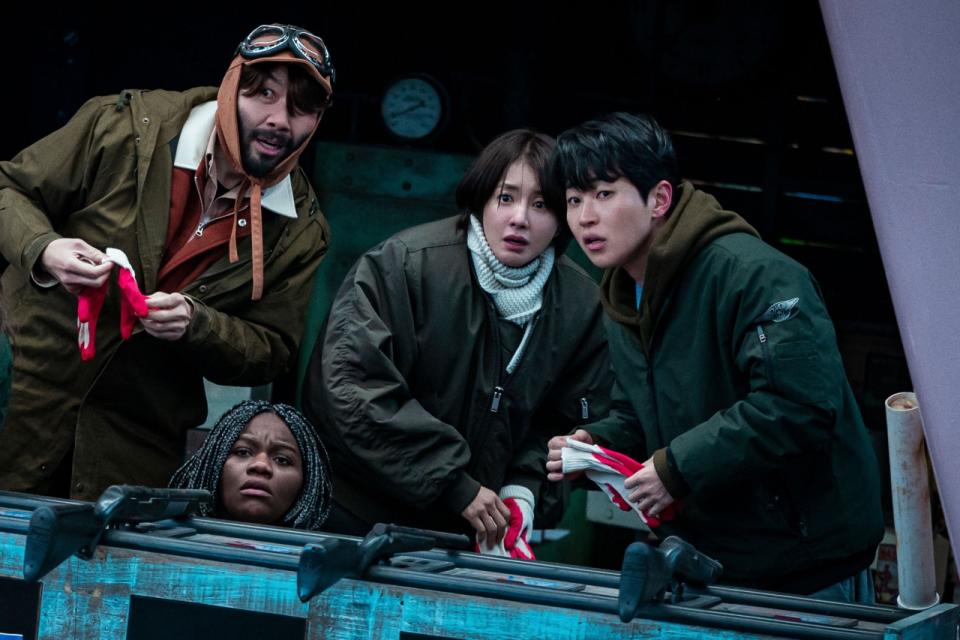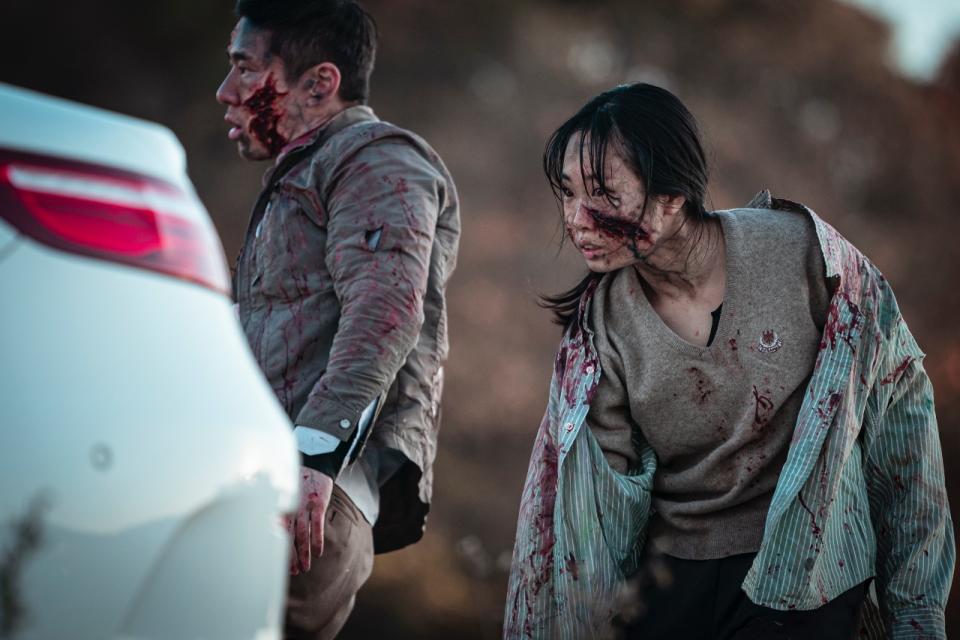“Few Countries Have Korea’s Level Of Experience With Zombies”: How The Creators Of Netflix’s ‘Zombieverse’ Staged A Reality TV Apocalypse In Seoul

EXCLUSIVE: In the opening scene of Netflix survival show Zombieverse, a dating couple in a bar in Seoul’s trendy Hongdae district lean in for a kiss.
But tell-tale bloodshot eyes and popping veins on the girl’s face signal something might just be amiss. Instead of a smooch, the young guy ends up having his neck chomped while blood is spurting everywhere. Cue screaming and chaos as the café’s other guests flee the scene – Seoul’s zombie apocalypse has begun.
More from Deadline
Produced by Kakao Entertainment and launched globally earlier this week, Zombieverse is a hybrid immersive reality show that forms part of Netflix’s expanding Korean unscripted slate, which has already seen hits such as Physical 100 drop on the platform. Ten contestants must work together to secure basic necessities and survive the zombie onslaught with the ultimate goal of reaching an evacuation ship on Wolmi Island (35 kilometres outside Seoul). If they get bitten, they turn into a zombie and exit the game.
“Korea already has a huge range of variety shows, and we’ve also seen a lot of zombie-themed scripted drama series and movies, so we thought it would be fun to bring them together – at least we knew the infrastructure was there,” the show’s creative producer Park Jin Kyung (My Little Television) tells Deadline.
“What makes it different to scripted drama is the realistic expressions of the contestants and the conflicts and dilemmas that arise. We don’t have a lot of close-ups, because that would make it feel like a movie or drama, but you can see in the wide shots that the reactions of the contestants are real.”
There are plenty of jump cut moments of shock and horror, but unlike most scripted zombie shows, there’s also a lot of humor. In lighter moments between fighting off flesh-eating foes, the contestants tease and jibe with each other as they figure out the best strategies to survive. Park and his producer-director partner Moon Sang Don (Hey! First Time in Korea?) might have set up the individual challenges but say they were surprised by how the contestants reacted.

“At first we were worried that they wouldn’t be able to immerse themselves in the environment we’d created, but their chemistry and reactions just kept getting better when they were in dire situations,” says Moon.
Park adds: “We deliberately chose contestants who were similar to the clichés in zombie movies, but in unscripted situations their actions surprised us. For example, we cast a pair of real-life siblings, who were supposed to look after each other, but when faced with danger they didn’t care for each other much at all.”
The siblings in question are Congolese YouTubers Jonathan and Patricia who grew up in Korea and speak fluent Korean. Most of the contestants are comedians, musicians, social media, sports and TV personalities so they’re used to being in front of the camera.
The cast also includes TV personality Ro Hong-chul (perhaps best known to international audiences as the pelvis-thrusting elevator guy in PSY’s Gangnam Style music video), actress Lee Si-young (Sweet Home), comedian Park Na Rae, Youtuber Dex, rapper DinDin, former baseball player Yoo Hee Kwan and Japanese singer Tsuki. There’s also a real-life doctor, urologist Kkwa Chu Hyung, another zombie movie cliché to keep things real.
Using local expertise
When it came to creating the actual zombies, Korea had a distinct advantage, having been home to a string of genre movies including Train To Busan and its sequel Peninsula, and Netflix zombie-themed series All Of Us Are Dead and Kingdom. The production used the art design team behind All Of Us Are Dead, a high school-set zombie series based on a Naver webtoon, and the action choreographers from Kingdom – the period zombie show that ran for two seasons and a movie.
Not only does Korea have expertise in zombie special effects make-up, Moon explains, it now has a whole army of actors and action choreographers with experience in the ways that zombies move. “In addition to the films and series, there are also K-pop videos that are zombie-themed, so you could say we have some actors who are becoming zombie specialists,” says Moon. “They told us they had a lot of fun on this show, because unlike a scripted series where the takes are quite short, they could wander around in zombie character for ages.”
That level of experience also made it easier to keep both the contestants and zombie actors safe. “If somebody pushes or shoves the zombie actors, they know how to deal with that, but of course there are some scenes that are more violent that were put together using special choreography and stunt actors,” explains Park. “We wanted to blur the line between scenes that are choreographed and those that are real, so we used a lot of editing techniques to keep everything looking natural.”

The production filmed for a total of six days, but spread over a period of several weeks due to the busy schedules of the contestants. The producers got them back in character after days apart by doing lengthy warm-up sessions, and the production also had a big focus on continuity, especially in wardrobe and special effects make-up, to keep things seamless.
Park says they didn’t have to apply for shooting permits or lock down busy Seoul streets, as the challenges take place in locations including a gas station, supermarket and funeral home that they were able to rent from private owners. The concept of the show is that the contestants are escaping from Seoul, not running into it, he adds, so many scenes were filmed in quiet outskirts and at an isolated rural village. Shooting at night – a natural feature of any self-respecting zombie series – also helped to ensure quieter, onlooker-free locations.
The opening scene was filmed for real in Hongdae, usually one of Seoul’s busiest nightlife districts, but Park explains that it was raining hard on the day of the shoot so there were less people around than usual. “We thought we might have to apply for a shooting permit, but there are so many YouTubers filming in Hongdae that it’s become a kind of free-for all so we didn’t need to get permissions or lock anything down.”
When asked if this kind of format could be replicated in other countries, Park and Moon turn to each other and laugh. “It may be difficult – few countries have Korea’s level of experience with zombies,” says Park grinning. “Maybe one way out would be to build everything in a studio or lock down a huge location. But it’s not the kind of thing you can shoot guerrilla style on the streets of New York.”
Best of Deadline
SAG-AFTRA Interim Agreements: List Of Movies And Series Granted Waivers
2023 Premiere Dates For New & Returning Series On Broadcast, Cable & Streaming
Sign up for Deadline's Newsletter. For the latest news, follow us on Facebook, Twitter, and Instagram.

